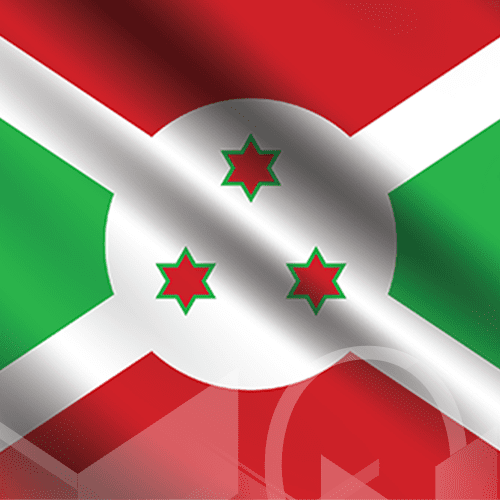
Filter
Sample Reports
Related Links
Burundi
Located in east-central Africa and surrounded by Zaire, Rwanda, and Tanzania, the landlocked Republic of Burundi has a land mass of 27 834 km², a population of 13.2 million and a GDP of US$2.78 bn and its currency is the Burundian Franc.
Burundi's primary natural resources are nickel, uranium, rare earth oxides, peat, cobalt, copper, platinum, vanadium, arable land, hydropower, niobium, tantalum, gold, tin, tungsten, kaolin and limestone. Operating industries include light consumer goods such as blankets, shoes, soap, and beer, assembly of imported components, public works construction and food processing. Its major exports are coffee, tea, sugar, cotton and hides.
The Republic of Burundi is a constitutional, multiparty republic with an elected government. President Evariste Ndayishimiye was elected in 2020 for a seven-year term of office. The ruling party, CNDD-FDD, has dominated the political scene since 2005, with a large majority in the National Assembly (87 out of 123 seats) and the Senate (38 out of 39 seats). Legislative elections are planned for May 2025 and will follow the new country’s administrative structure which reduces the numbers of provinces from 18 to 5 and the new number of parliamentarians will be 103.
The National Development Plan (NDP) was updated to implement Burundi’s vision, "Emerging country in 2040 and developed country in 2060". The NDP has an overall objective of transforming structurally the Burundian economy for strong, sustainable, resilient, and inclusive growth, creating decent jobs for all and leading to the improvement of social well-being.
Economic growth accelerated to 2.7% in 2023, up from 1.8% in 2022, supported by favourable rainfall and increased investment but slowed to 2.2% in 2024, as persistent fuel and foreign exchange shortages continue to weigh on the economy. Growth of 3.9% is expected in 2025-26, supported by agriculture, mining, and government spending.
Inflation averaged 27.1% in 2023, due to surging food and fuel prices but eased to 22.1% in 2024, as improved rainfall and restrictions on cereal exports help lower food prices. Public debt, projected at 70.6% of GDP in 2024, is expected to decline to 67.4% of GDP by 2026.
The current account deficit reached 16.6% of GDP in 2023, driven by high oil prices and sluggish exports but improved to 15.9% in 2024, with further reductions to 13.6% expected by 2026, as mining exports resume and forex reforms take hold.
Sources: Who Owns Whom sector reports, CIA Factbook, African Development Bank, World Bank, Trading Economics, African Statistical Yearbook and IMF. ?>
Company Profile
There is no data available at the moment
Sector Research
There is no data available at the moment


